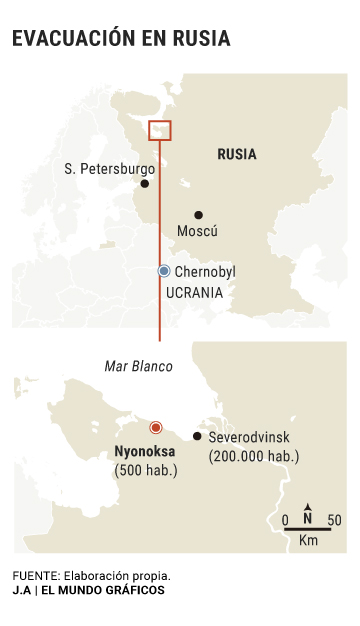- Radiation: Fear of a new Chernobyl after exploding Russian missiles
- Explosion: At least two dead and six injured by an explosion in a military estate in northern Russia
- Tragedy: 14 Russian sailors die from a fire in a submersible
Russian authorities have asked Nyonoksa's neighbors to temporarily leave the town, located next to the place where a rocket engine with radioactive material exploded on Thursday.
In the Severodvinsk region there is fear of radiation, although the Government said the evacuation has nothing to do with the accident, but is due to military maneuvers. But the announcement came hours after the Russian meteorological agency Rosgidromet claimed that nuclear radiation levels in the area multiplied between 4 and 16 times after the incident last week. The Russian Army even banned swimming and fishing for a month throughout the Bay of the White Sea where this nearby Russian Arctic town is located.
A government spokeswoman announced yesterday afternoon that in a matter of hours a special train would be sent to transport the residents of the village, who must leave it between 5.00 and 7.00 on Wednesday. The soldiers themselves have spoken with the neighbors to convince them that there is no connection with the explosion last Thursday.
Nyonoksa is a small settlement that depends on Severodvinsk, a town located about 30 kilometers away. It is located on the coast of the Onega Bay of the White Sea. Only two kilometers from Nyonoksa there is a rocket launching platform of the Russian Navy that bears the same name. In that area numerous rockets of the R-27, R-29 and other prototypes are launched since 1965 for use in submarines. There is also an assembly base for atomic and conventional submersibles nearby.
The spokeswoman for the administration of the city of Severodvinsk, Ksenia Yudina, said that "the Nyonoksa delegation received a notice of activities planned by the Army." Therefore, "Nyonoksa residents were asked to leave the village while the activities were carried out on Wednesday morning," he told RIA Novosti news agency. The half thousand residents of this village have had rocket scares in the past. In December 2015, a failure during a missile launch test resulted in a block of flats being reached. A fire occurred, but all residents were evacuated on time.
In the case of the incident last week, the Ministry of Defense initially said that the radiation had not been altered after the incident, but the Severodvinsk authorities revealed that there was a rebound. Greenpeace calculates a 20-fold increase in the level of radiation. For its part, Moscow has ruled out risks to the health of the population after the incident and notes that "there should be no doubt that all competent institutions fully guarantee safety." The Kremlin spokesman, Dimitri Peskov, said that "the authorities are doing everything necessary" and has asked the population to consult the official information and not the one published by the media.
Residents of the city of Severodvinsk, about 30 kilometers east of Nyonoksa, have bought iodine doses in pharmacies from the moment they learned of the accident (iodine is often taken to protect the thyroid gland of some types of radiation). While Nyonoksa's neighbors packed their bags, the governor of the Arjangelsk region, Igor Orlov, assured the Interfax agency that there was no evacuation but "request" to leave the place. And he added that it is not the first time this has happened. However, local media say there were rumors of evacuation among the neighbors for days.
The news agency Severny Novosti reported without detailing its sources that an area of the Arjangelsk Regional Clinical Hospital has been sealed, where the victims of the explosion were admitted. Doctors have had to sign a confidentiality agreement.
According to American experts, the accident is probably linked to the tests of a cruise missile: the 9M730 Burevestnik. In a tweet, US President Donald Trump said Monday that much was reported "about the explosion of a Russian defective missile," presuming that the United States has "a similar, but more advanced , technology."
Yesterday Peskov refused to confirm that it was Burevestnik, but said the Russian level in terms of missiles with nuclear engines "significantly exceeds that reached by other countries and is quite exceptional." As for the incident, he simply commented that "accidents, unfortunately, happen, and are tragedies; but in this particular case, it is important that we remember those heroes who lost their lives," he told reporters.
According to the criteria of The Trust Project
Know more- Nuclear energy
- Russia
DefenseThe US exit from a key treaty unleashes fear of the nuclear race
Salamanca Four dead and two injured after leaving the road a tourism in Galisancho
Defense Cold War between the United States and China

